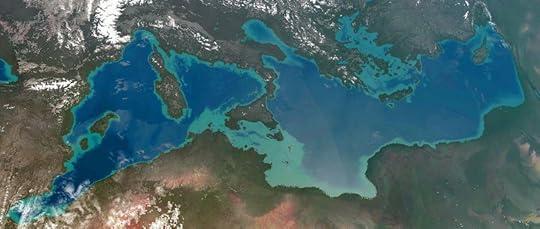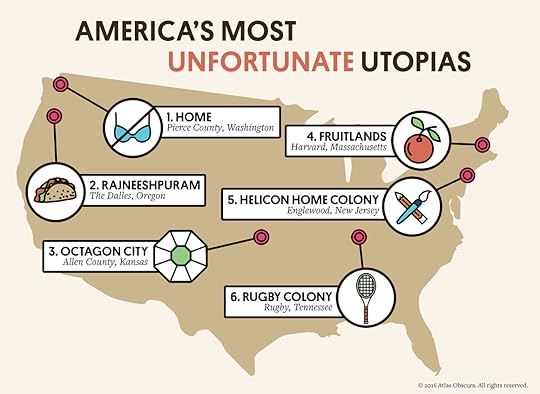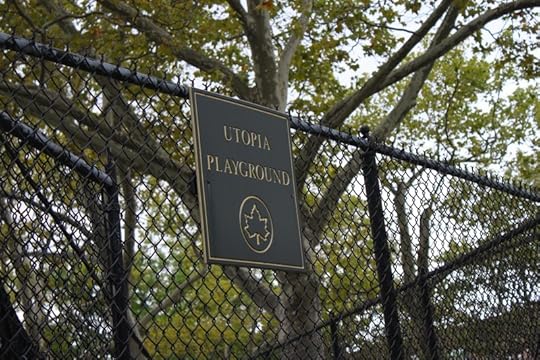Dermott Hayes's Blog: Postcard from a Pigeon, page 43
September 16, 2016
One Single Memory
Yet another Flax Golden Tale – a wonderful paen to love and memories of lost childhood- from Caillen James
The pillow fight–
You got that gash
Above your eye
From all the glass.
The gifts you bought
Our toes in sand
And all the times you held my hand.
When we were nine
You’d write those lines
And every year
We’d mark the time.
September breeze
When we were free
Cause we were kids
And we could dream.
Now all that’s here–
Just one Band-Aid
And all the things
We left unsaid.
Our dreams were left
And childhood spent
Cause youth is when
The Sidewalk Ends.


Sensitive Bull
He hated these public outings. Too much was expected of him, he complained and nothing original in it, either. They were reinforcing stereotypes and by insisting on his participation, made him complicit in these nefarious excursions. What this time? Not another bloody china shop. Bulls can be fragile, too, y’know.


Ethiopian Feminist Commune
by Zac Crellin
September 14, 2016
827

The village center of Awra Amba. (All Photos: Zac Crellin)

Tucked away between the rugged gorges and valleys of the Ethiopian highlands is an egalitarian commune that defies the norms of traditional society. Awra Amba, founded in the utopian mold 44 years ago, has managed to thrive where so many other attempts have failed.
Awra Amba could be described as communist, puritanical, pantheistic, feminist, or even cult-like, but its 450 residents are wary of such descriptors. They believe their philosophy, as dictated by the community’s soft-spoken founder Zumra Nuru, is too easily distorted by cultural and linguistic differences to be labeled accurately by outsiders.
Nevertheless, four tenets do underpin the community’s way of life: respecting women’s rights, respecting children’s rights, caring for the elderly and vulnerable, and avoiding antisocial behavior. Today Awra Amba is governed by 13 democratically-elected committees, which cover everything from education to conflict resolution, taking care of orphans to village security.


September 15, 2016
The Man who tried to drain the Med

Herman Sörgel, in 1928, who conceived of Atlantropa. (Photo: Public Domain)
It’s not just the plot of a Philip K. Dick book—a man spent his life trying to make Atlantropa happen.
by Toon Lambrechts
September 13, 2016
853

An artist’s rendering of what Atlantropa—a plan to partially drain the Mediterranean—might have looked like. (Photo: lttiz/CC BY 3.0)

Later this year, Amazon Studios will release the much-anticipated second season of The Man in the High Castle, a story set in a grim alternative future, where the Axis Powers have won World War II. The United States is cut up in three parts, with a Nazi puppet state in the West, a region under Japanese occupation in the East, and a neutral buffer zone between them. The series is loosely based on a sci-fi classic written by Philip K. Dick. In the original novel, published in 1962, Dick describes how the Axis Powers have drained the Mediterranean, in order to reclaim vast swaths of additional farmland.
The story is widely seen as an allegory on Fascism. But somehow, the most farfetched of this complicated plot is the one closest to reality: the part about emptying the Mediterranean.
In fact, the plan was a very seriously considered proposal, mapped out a few decades earlier by the German architect Herman Sörgel who devoted his whole life to promote his grand scheme to drain the Mediterranean and unite Europe and Africa into one super continent.


WEIRD, BUT TRUE
by Molly McBride Jacobson
September 13, 2016
1,479
In 1945, the first atomic bomb was set off during the Trinity Test in the New Mexican desert. This marked the birth of the Atomic Age, a period of nuclear experimentation that would alter the world on a sociocultural level, not to mention an elemental one.
Today we know the danger of exposure to atomic bombs. First there is the initial fiery explosion, caused by the splitting of an atom. However, the arguably more dangerous effect of the atom bomb is its radiation, both from the original blast and the residual radioactivity left in its wake. This can spread over a miles-long diameter, but is most concentrated at ground zero, the point directly underneath the detonation. Hence why this video of five men standing directly beneath an atomic bomb test is a bit disturbing.


Deaf Snail
‘I hate lugging these shells around, particularly when they’re new or they simply don’t fit.’
‘Stop moaning, it’s boring, you can be such a slime.’
‘What did you say?’
‘I asked if you know the time?’
‘Time to eat, I’ll bet.’
‘You’re such a slug.’
‘What?’
‘I said, such a slog.’


Read, write, listen, write more

How to Be a Writer: 10 Tips from
Rebecca Solnit
Joy, Suffering, Reading, and Lots and Lots of Writing
September 13, 2016 By Rebecca Solnit
1) Write. There is no substitute. Write what you most passionately want to write, not blogs, posts, tweets or all the disposable bubblewrap in which modern life is cushioned. But start small: write a good sentence, then a good paragraph, and don’t be dreaming about writing the great American novel or what you’ll wear at the awards ceremony because that’s not what writing’s about or how you get there from here. The road is made entirely out of words. Write a lot. Maybe at the outset you’ll be like a toddler—the terrible twos are partly about being frustrated because you’re smarter than your motor skills or your mouth, you want to color the picture, ask for the toy, and you’re bumbling, incoherent and no one gets it, but it’s not only time that gets the kid onward to more sophistication and skill, it’s effort and practice. Write bad stuff because the road to good writing is made out of words and not all of them are well-arranged words.


We need to talk about Lionel
By ROD NORDLANDSEPT. 12, 2016

The author Lionel Shriver caused a stir at the Brisbane Writers Festival. Credit Gary Doak/Writer Pictures, via Associated Press
BRISBANE, Australia — Officials in charge of an Australian writers festival were so upset with the address by their keynote speaker, the American novelist Lionel Shriver, that they censored her on the festival website and publicly disavowed her remarks.
The event, the Brisbane Writers Festival, which ended Sunday, also hurriedly organized counterprogramming, billed as a “right of reply” for critics of Ms. Shriver, whose speech had belittled the movement against cultural appropriation. They scheduled the rebuttal opposite a session Saturday afternoon in which Ms. Shriver was promoting her new novel, “The Mandibles.”
Ms. Shriver had been billed as speaking on “community and belonging” but focused on her views about cultural appropriation, a term that refers to the objections by members of minority groups to the use of their customs or culture (or even characters of their ethnicity) by artists or others who do not belong to those groups.


September 14, 2016
YELLOW TAXI
Remember that Joni Mitchell song about how they paved paradise and put up a parking lot? That song always springs to mind when I read about utopia, which, according to dictionaries, is an imaginary place where everything is perfect. I remember reading about the utopias set up, supposedly, by anarchist idealists when, in point of fact, anarchy, as an ideology, rejected the notion of perfection. Semantic or ideological arguments aside, people have strived to create utopia communities, from socialist communes in Russia, Ireland and Germany in the late 19th and early 20th century, among a few, to the hippy communes of the ’60s and religious cult movements like the followers of the Bhagwan Shree Rajneesh in Oregon, USA in the ’80s.
This latter was of particular interest to me because as the Bhagwan fled the Unites States, a fugitive from federal tax charges among other things, he hid out, temporarily, on the top floor of a hotel in Limerick City, Ireland. Yours truly was dispatched by my newspaper, The Sunday Press, to get an interview with the fugitive guru and the background to his flight from the United States. But that’s a story for another day.
Atlas Obscura has put together a compendium of American utopia that became anything but heaven on earth. It’s a fascinating yarn and who knew Queen’s, New York has its own Utopia?
The Illustrated Map of America’s Worst Utopias
The road to weird food communes and sex cults is paved with good intentions.
by Lauren Young
September 12, 2016

772
(Graphic by Michelle Enemark)
268
 An award-winning playground. (Photo: Jack Goodman)
An award-winning playground. (Photo: Jack Goodman)
New York City has many glorious and terrible attributes. One thing it generally isn’t, though, is utopian. One fifth of the population live below the poverty line, yet it has the highest cost of living in the U.S., with few of the egalitarian living arrangements typical of utopian communities. Yet there is one place in the sprawling metropolis, however, that is literally a Utopia.
Utopia, Queens, is a tiny neighborhood surrounded by Jamaica Estates, Fresh Meadows, and Flushing.


September 13, 2016
The Standing Rock Sioux Have Been Heard. Now What?
By Zoë Carpenter

Protesters demonstrate against the Dakota Access oil pipeline near the Standing Rock Sioux reservation in Cannon Ball, North Dakota on September 9. (Reuters / Andrew Cullen / File Photo)
On Friday, when a federal judge denied the Standing Rock Sioux’s request to halt construction on a major oil pipeline being built near their reservation in North Dakota, tribal chairman David Archambault II was disappointed, but hardly shocked. That’s the way things have always gone: land taken, treaties broken, and little relief from the legal system. “We felt that the deck was stacked against us,” Archambault said on Monday. “It’s how tribes have been treated for two hundred years.”
But what happened a few minutes later was truly surprising: three federal agencies stepped in to suspend construction near Lake Oahe, where Energy Transfer Partners—the company backing the pipeline—planned to bore beneath the Missouri river, which the Sioux depend on for their water. The statement from the Departments of Justice, the Interior, and the Army acknowledged the “important issues raised by the Standing Rock Sioux Tribe and other tribal nations and their members regarding the Dakota Access pipeline specifically, and pipeline-related decision-making generally.” The agencies called for a “serious discussion” with tribal governments about “whether there should be nationwide reform with respect to considering tribes’ views on these types of infrastructure projects.”


Postcard from a Pigeon
- Dermott Hayes's profile
- 4 followers




